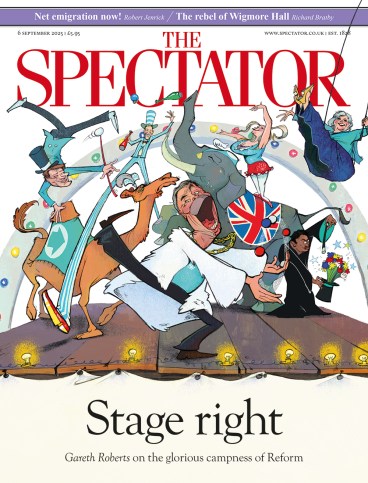
Another week, another show striving desperately to become the new Traitors. So it is that The Inheritance brings a group of disparate people together in a very big house, gives them tasks that win them money and invites them to pretend to cooperate while secretly behaving treacherously. In fact, about the only surprising thing about it is that it’s pretty good.
It’s also, I think, pretty knowing: aware of its possible absurdity, often quite camp, yet still going about its business with a face set resolutely to po.
The premise is that the very big house’s owner has died, leaving a rather implausible will that requires 13 strangers to compete for her money by collecting stuff and betraying each other. In something of a coup, the owner is played by Liz Hurley who issues her posthumous instructions in a series of video clips and cleavage-revealing dresses. Lizzing it up to the max, she begins every clip with a flirtatious ‘Hello, darlings’, before serving up an impressive number of single entendres about her own raciness.
Appearing as the will’s executor is Rob Rinder who doesn’t opt for understatement either, explaining the rules and chivvying the contestants with an almost pathological degree of solemnity.
But I can’t put it off any longer. Here are the rules in question, complete with what the programme clearly hopes will become national buzzwords. The players work together on the tasks (aka ‘requests’) but the money each day goes to only one of them (aka ‘the prime beneficiary’). Those who think they deserve it put themselves forward as ‘claimants’ at the nightly ‘division ceremony’, leaving the others (aka ‘the jury’) to decide who gets the cash. The winner then goes with Rob to ‘the strong room’ where they can put up to half of it in the cashboxes of chosen jury members, but not of unsuccessful claimants. They next inform the group what they’ve given to whom, although they don’t have to tell the truth.
As usual with Traitors-adjacent shows, this means that The Inheritance doesn’t have the pleasing straightforwardness of its progenitor. In this case, however, the complexity feels neither wildly excessive nor needless, because, once you’ve got to know how it works, it does set up plenty of properly interesting dilemmas – and may even make for richer viewing than you-know-what.
Lizzing it up to the max, Hurley begins every clip with a flirtatious ‘Hello, darlings’
And then of course there’s the reliable pleasure of passing judgment on the players and, in particular, of chortling at the most delusional. Here, these are led by an unspecified ‘entrepreneur’ called James – a man whose total incompetence in every aspect of the game is matched only by a total, if ultimately merciful lack of self-awareness.
Granted, there do seem two obvious problems with the format: the ‘requests’ are a) a bit rubbish; and b) carried out in small groups rather than all together, which leaves the voting process feeling fairly random. Nonetheless, this is the first shameless Traitors rip-off I can imagine sticking with, or becoming a fun family watch.
And now some good news for older viewers: the sketch show is back – or at least one of them is, in the shape of Mitchell and Webb Are Not Helping. The younger sort might find it hard to believe that television was once full of Oxbridge blokes in wigs performing little chunks of comedy – but when it was, David Mitchell and Robert Webb were two of the best in the business.
The genre fell out of favour partly because of the cost of having different sets and costumes every few minutes, but also because Oxbridge blokes lost their appeal to TV commissioners (although not to the wider public, it seems, given the success of podcasts like The Rest Is History, The Rest Is Politics and We Have Ways of Making You Talk).
This being 2025, any possible elitism still needs to be diluted, so the two poshos are now joined by four younger performers of suitable diversity. Happily, the unapologetic intelligence remains – and so does the winning knack for choosing unexpected but deserving targets. In this week’s first episode, for instance, there was sharp skewering of Emily Maitlis and her producer Sam McAlister’s rival dramas about the Prince Andrew interview. (‘Some stories need to be told! Twice! With slightly different takes on how the admin was done!’)
The elephant in the writers’ room is also faced head-on, with sketches set in the writers’ room where the two oldies ramble on about times past to general bafflement, and the young ’uns tie themselves in earnest knots trying to be politically pious. Yet even – or maybe especially – these sketches have an attribute that, along with plenty of good jokes, provides one of the show’s main pleasures: the transparent and touching sense of how delighted these people are to be working together on an actual TV sketch show.








Comments